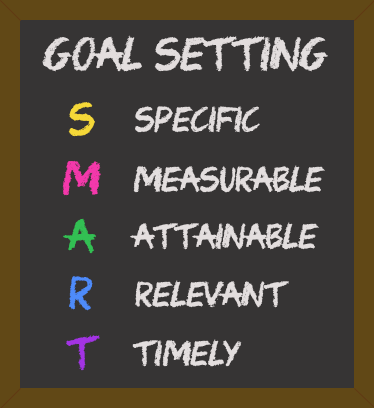 Implementing annual employee goals is a great way to encourage employees to continually improve performance and work towards company goals, but it can sometimes cause difficulties. Ineffective and unattainable goals can decrease morale and create frustration in the workplace. To help employees set achievable and meaningful goals, follow these tips this during your next performance evaluation.
Implementing annual employee goals is a great way to encourage employees to continually improve performance and work towards company goals, but it can sometimes cause difficulties. Ineffective and unattainable goals can decrease morale and create frustration in the workplace. To help employees set achievable and meaningful goals, follow these tips this during your next performance evaluation.
Think SMART
Whether you're solving world hunger or going back to school, you need a manageable plan to attain your goals. SMART is a simple mnemonic to help guide the planning process. When you sit down with your employees to set goals, create goals that are:
- Specific: Clearly identify what the goal is, how it will be accomplished and the timeframe in which it is to be completed.
- Measurable: Create a goal that has checkpoints and a specific endpoint.
- Attainable: Focus on realistic goals that can be achieved with employee workload and responsibilities.
- Relevant: Goals should align with employee job duties and company objectives.
- Timely: Ensure that goals can be attained within the time allotted by the organization.
By following the SMART guidelines for goal planning, you can ensure that your employees' goals have the planning and forethought needed for accomplishment.
Check in Frequently
A common problem employers run into is working with employees on an annual goal and then finding that no work has been accomplished when it is time to review their progress. If you're only checking in with employees at the beginning and the end of the process, you will probably have a high goal-attainment failure rate.
Schedule monthly or quarterly meetings with employees to discuss their goal progress. Assign milestones for the next meeting to help advance employees towards their goal. This will keep the employee's goal at the front of their mind and provide some accountability for achieving that goal.
Reward Success
What's an achievement without a celebration? Not only does celebrating the achievement of employees' goals encourage other employees to reach their own but it also rewards employees who have worked hard to meet their own. Don't keep goal attainment a secret. Whether it's a breakfast, a cake or an afternoon off, publish and celebrate your employees' achievements when meeting their annual goals.
Encourage Progress
Despite following SMART goal setting and checking in with employees, some won't be able to meet their goals in the timeframe allotted. It may be that work demands increase and make goal achievement impossible or job duties change and education on those new responsibilities takes additional man-hours away from goal progress. Don't discourage employees who aren't able to meet their goals within the time frame allotted. Encourage meaningful progress of goal attainment by providing positive feedback and encouragement even when employees aren't meeting achievements on the timeline you set up at the beginning of the journey. Keeping positive about progress will encourage employees to continue, even when timelines aren't being met.
Creating employee goals doesn't need to be an exercise in futility. Well-planned goals can help employees achieve more from their jobs and companies gain more from their employees. Focus on making SMART goals, checking in frequently on progress and celebrating success to keep employees motivated and engaged.
